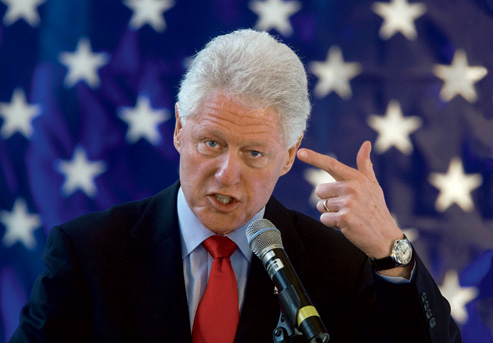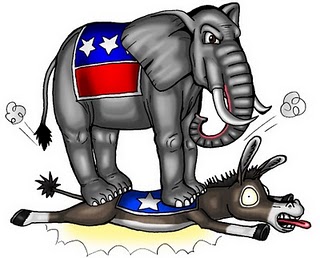UnitedHealth's Big Announcement: Just What the Doctor Ordered?
Thank you, UnitedHealth Group. Your jaw-dropping profit announcement may be just what the doctor ordered.

Thank you, UnitedHealth Group. Your jaw-dropping profit announcement may be just what the doctor ordered.
Submitted by Anne Landman on
Ads being run by the U.S. Chamber of Commerce contain demonstrably false distortions of truth and statements that fact-checkers have repeatedly exposed as false. The Chamber's "cookie-cutter" ads running across the U.S.
Submitted by Anne Landman on
ThinkProgress has discovered that the U.S. Chamber of Commerce is funding political attack ads from its general account, which includes funding from foreign entities. As a 501(c)(6) organization, the Chamber can legally raise and spend unlimited funds without disclosing its any of its donors.
 A powerful advocacy organization has made a big impact on this midterm election cycle in states across the country. Americans for Job Security (AJS) has spent millions of dollars on attack ads targeting candidates they view as anti-free market. While this group believes in the free exchange of capital, they are vehemently opposed to the free exchange of information, at least when it comes to their sponsors. AJS has routinely denied requests for a list of donors. As a 501(c)(6), they do not have to reveal this information. But the IRS has stated that any 501(c)(6) group whose "primary purpose" is political activity, must name their donors. The Washington Post reports that AJS spends the vast majority of its budget on television and radio ads before elections. Groups such as Public Citizen have complained to the IRS about AJS' abuse of its tax-exempt status. But the ambiguous nature of the IRS' "primary purpose" standard has allowed AJS to continue spewing attack ads every election cycle.
A powerful advocacy organization has made a big impact on this midterm election cycle in states across the country. Americans for Job Security (AJS) has spent millions of dollars on attack ads targeting candidates they view as anti-free market. While this group believes in the free exchange of capital, they are vehemently opposed to the free exchange of information, at least when it comes to their sponsors. AJS has routinely denied requests for a list of donors. As a 501(c)(6), they do not have to reveal this information. But the IRS has stated that any 501(c)(6) group whose "primary purpose" is political activity, must name their donors. The Washington Post reports that AJS spends the vast majority of its budget on television and radio ads before elections. Groups such as Public Citizen have complained to the IRS about AJS' abuse of its tax-exempt status. But the ambiguous nature of the IRS' "primary purpose" standard has allowed AJS to continue spewing attack ads every election cycle.
Submitted by Anne Landman on
 After 121 years as an independent event, the iconic New Year's Day Rose Parade has sold its naming rights to the American Honda Motor Company, the U.S.-based headquarters of the Japanese car manufacturer. The name of the 2012 event will be "The 122nd Rose Parade, Presented by Honda." Honda will get the lead float in the parade, and full usage rights for the Tournament of Roses.
After 121 years as an independent event, the iconic New Year's Day Rose Parade has sold its naming rights to the American Honda Motor Company, the U.S.-based headquarters of the Japanese car manufacturer. The name of the 2012 event will be "The 122nd Rose Parade, Presented by Honda." Honda will get the lead float in the parade, and full usage rights for the Tournament of Roses.
Originally published on September 22, 2010 in Health Care and Tennessee Voices.
 As I sit beside my 92-year-old father in his hospital bed in Kingsport, Tennessee, there are reminders all around me of why I left my job in the insurance industry to become an advocate for health-care reform — and why all Americans have reasons to be grateful that many provisions of the reform bill that became law six months ago are taking effect now.
As I sit beside my 92-year-old father in his hospital bed in Kingsport, Tennessee, there are reminders all around me of why I left my job in the insurance industry to become an advocate for health-care reform — and why all Americans have reasons to be grateful that many provisions of the reform bill that became law six months ago are taking effect now.
To begin with, there is my dad himself. He must take costly medications every day. This year he and millions of other older Americans fell into the Medicare Part D "doughnut hole." They have to spend thousands of dollars for medicines they need before their drug benefit will kick back in. The new law has already begun to reduce their pharmacy expenses.
 Activists, concerned citizens, and democrats (written purposely with a lower "d"), watch out. As George Orwell stated in his ominous book 1984, "Big Brother is watching you." One need to look no further than the creepy and covert Orwellian events that were recently unearthed in Pennsylvania as Exhibit A for a reflection of the current horrifying environment that exists for those who choose to speak out against governmental and corporate injustices and in this instance, against fracking in the Marcellus Shale.
Activists, concerned citizens, and democrats (written purposely with a lower "d"), watch out. As George Orwell stated in his ominous book 1984, "Big Brother is watching you." One need to look no further than the creepy and covert Orwellian events that were recently unearthed in Pennsylvania as Exhibit A for a reflection of the current horrifying environment that exists for those who choose to speak out against governmental and corporate injustices and in this instance, against fracking in the Marcellus Shale.
Submitted by Anne Landman on
 Former President Bill Clinton established the Clinton Global Initiative (CGI) in 2005 to implement innovative solutions to some of the world's most pressing problems, like hunger, poverty and access to health care.
Former President Bill Clinton established the Clinton Global Initiative (CGI) in 2005 to implement innovative solutions to some of the world's most pressing problems, like hunger, poverty and access to health care.
Submitted by Anne Landman on
 Republican-backed third-party advocacy groups are far outspending similar Democratic-leaning groups in the run-up to the November mid-term election. A company that tracks political advertising reports that from August 1 to September 8, Republican groups spent $10.9 million on television ads to influence Senate races, compared to $1.3 million spent by Democratic groups.
Republican-backed third-party advocacy groups are far outspending similar Democratic-leaning groups in the run-up to the November mid-term election. A company that tracks political advertising reports that from August 1 to September 8, Republican groups spent $10.9 million on television ads to influence Senate races, compared to $1.3 million spent by Democratic groups.
 In Glenn Beck's "Restoring Honor" rally last week, held on the anniversary of Martin Luther King Jr.'s 1963 "I Have a Dream" speech, Beck claimed that he and his Tea Party followers would "take back the civil rights movement." While King's speech led Congress to pass the landmark 1964 Civil Rights Act, Beck's movement could lead to that Act's abolishment. Although Beck has not publicly called for overturning the 20th century's greatest piece of equality-advancing legislation, the libertarian philosophy he espouses is at odds with the way the 1964 Civil Rights Act prohibits discrimination by private businesses. While Beck did not clearly state how he would reclaim the civil rights movement (he asserted that his rally was nonpolitical and aimed at "restoring America's traditional values") other leading libertarian right-wingers have called for abolishing some of the Act's most important elements, saying they constitute unnecessary government interference with the market. While undoing the Civil Rights Act through political channels would be almost impossible, the U.S. Supreme Court may have granted the right-wing a means to do so through the judiciary. The Court's reasoning in its January 2009 Citizens United decision could put some of the most important parts of the Civil Rights Act at risk.
In Glenn Beck's "Restoring Honor" rally last week, held on the anniversary of Martin Luther King Jr.'s 1963 "I Have a Dream" speech, Beck claimed that he and his Tea Party followers would "take back the civil rights movement." While King's speech led Congress to pass the landmark 1964 Civil Rights Act, Beck's movement could lead to that Act's abolishment. Although Beck has not publicly called for overturning the 20th century's greatest piece of equality-advancing legislation, the libertarian philosophy he espouses is at odds with the way the 1964 Civil Rights Act prohibits discrimination by private businesses. While Beck did not clearly state how he would reclaim the civil rights movement (he asserted that his rally was nonpolitical and aimed at "restoring America's traditional values") other leading libertarian right-wingers have called for abolishing some of the Act's most important elements, saying they constitute unnecessary government interference with the market. While undoing the Civil Rights Act through political channels would be almost impossible, the U.S. Supreme Court may have granted the right-wing a means to do so through the judiciary. The Court's reasoning in its January 2009 Citizens United decision could put some of the most important parts of the Civil Rights Act at risk.
Center for Media and Democracy (CMD)
520 University Ave, Ste 305 • Madison, WI 53703 • (608) 260-9713
CMD is a 501(c)(3) tax-exempt non-profit.
© 1993-2025